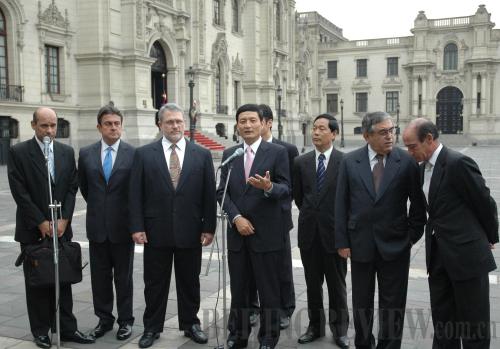|
 |
|
COPPER COOPERATION: Xiao Yaqing (center), former Chinalco CEO, answers questions during a news conference held at the presidential office in Lima, Peru, on May 5, 2008, after Chinalco and Peru Copper Inc. signed an exercise contract for the Toromocho copper project (LIU GUOQIANG) |
A timely decision
SASAC did, however, acknowledge the positive side of SOEs' overseas investment.
"In recent years, SOEs have seen a rapid growth in their overseas business scale and expansion in overseas business fields. Some SOEs have created lots of successful experiences in supervising overseas assets," said SASAC.
SASAC also acknowledged its weakness in supervising overseas state-owned property. "Some SOEs slack off when it comes to internal management and risk control, which may affect the security of overseas state-owned assets," it said.
In a bid to further strengthen supervision and protection on SOEs' overseas assets, the SASAC released the two interim regulations which were enacted with full consideration of the lessons and experiences SOEs have learnt from their outbound investment in recent years, SASAC said.
The oversight organization also gave the legal basis of the two regulations, namely, the Law on State-Owned Assets and the Interim Regulations on Supervision of State-Owned Assets released in 2003.
The two interim regulations were innovative in supervising state-owned assets and property rights. The Interim Regulations on the Supervision and Administration of Overseas Assets of Central SOEs have set out detailed rules to regulate behavior that may easily cause losses of overseas investment, for example, the individual equity holding, offshore company management and salary of expatriate staff.
Despite the fact Chinese centrally administered SOEs have increasing outbound investment, they still lack systematic management measures to supervise overseas assets, said Zhang Hanlin, Director of the Center for WTO Studies at the University of International Business and Economics.
Due to the lack of a complete supervision mechanism, SOEs and their regulators often failed to see risks in overseas investment, especially in the field of financial investment, Zhang said.
The best way to regulate SOEs' overseas investment, shield investment risks and prevent losses of state-owned assets is to enhance legislation timely, Zhang said.
The release of the two interim regulations is the inevitable result of the country's efforts to enhance supervision on overseas investment, Zhang said.
Risk management
Facing huge losses in overseas investment, it is time for SOEs to fulfill their own responsibilities.
SASAC has issued two preventive regulations, but the SOEs themselves need to enhance risk management in their overseas operation, said He Liping, a professor with the School of Economics and Business Administration of Beijing Normal University.
A standard administrative structure and complete internal management mechanism are needed to enhance risk control, especially for overseas investment of SOEs, He said.
Wang Ying, an analyst with the Shanghai-based CBN Research Institute, echoed He's idea.
"At present, the domestic parent SOEs should be responsible for the supervision on overseas assets and properties. A daily mechanism to control risk should be set up and the decision-making procedure should be regulated," Wang said.
"Even though the SASAC has stipulated detailed rules, only the SOEs themselves can achieve their investment goals and risk control. The new regulations are just macro-level guidance," Wang added.
SOEs should look to protection of their overseas investment, said Wang Hai, an analyst with China Securities Co. Ltd.
If the host countries refuse to compensate the asset loss in exchange rates, nationalization and political turmoil, Chinese SOEs could claim losses to the insurance issuers, he said.
China should learn from the success of the United States and Japan in insurance for overseas investment and promote the launching of relevant insurance measures in China, he said. | 